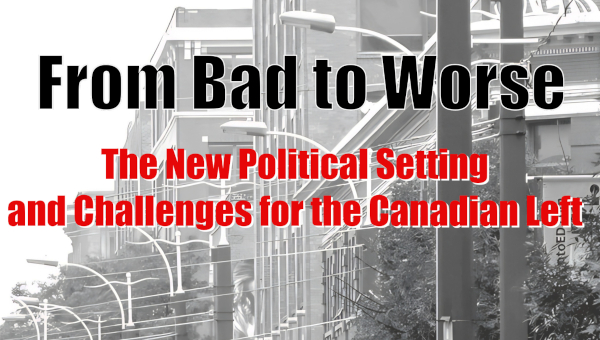Confronting Industry Shutdowns
Multinational’s Assets Seized in Newfoundland
A Conservative Party provincial premier has presented an unlikely challenge to trade unions and the New Democratic Party across Canada. No, it’s not another assault on workers’ rights and living conditions. It’s a surprising decision to stand up to a corporate giant. On December 18, the House of Assembly of the Province of Newfoundland and Labrador unanimously approved a resolution to revoke the access to timber and river water held by paper conglomerate AbitibiBowater in central Newfoundland.
It’s the kind of measure that NDP governments in other provinces run away from, fearing big-business backlash and saying it would damage electoral prospects. But Premier Danny Williams’ move has received near-universal acclamation in his home province and has been welcomed by working people across Canada and into the United States, especially those in hard-hit, resource-based communities.
Writing for the Quebec monthly journal and website L’Aut’Journal, editor Pierre Dubuc says the Newfoundland government decision “sends a message that workers can demand of their governments measures other than habitual compliance.”
He contrasts the Newfoundland decision with reaction by the Quebec government to a recent paper mill closing by Abitibi in Donnacona, Quebec that cost 250 jobs. There, the Quebec government shrugged its shoulders and said there was nothing it could do to save jobs.
Paper Mill Closure
The Newfoundland government’s move followed an announcement by AbitibiBowater that it would close its giant paper mill in Grand Falls-Windsor in March 2009. The mill and related forest and hydro-electric operations employ some 900 workers.
As of the mill closing, the government will end the company’s access to timber on some four million acres of land and to river-water resources used in electrical generation. The government will expropriate hydro-electric installations run by the company. The mill itself will remain in company hands.
The government will pay the company for its seized assets at a price to be negotiated. Environmental clean-up costs and severance pay for workers will be factored into any final price.
In a feature interview on CBC Radio’s The Current on December 22, Williams explained his government’s decision. “We need to make sure that we properly safeguard our natural resources, and that we enter into proper corporate arrangements with our business partners. I’m the first one to say that businesses should earn a profit, and make a handsome profit if they’re able to run their businesses effectively.
“But don’t take, take, take from Canadians, not reinvest, suddenly close down operations, and think you’ll walk away with the goodies.”
AbitibiBowater says it will challenge the government’s moves under the terms of the North American Free Trade Agreement, arguing that a nearly 100-year-old agreement allows it to do whatever it wants with timber and water resources, including selling its access to others. Williams says Abitibi should tread carefully because its financial relationship with provincial and federal governments in Canada would come under scrutiny during such a challenge and are probably in violation of the treaty because of the extensive subsidies that paper companies receive in Canada.
The Globe and Mail national daily published a harsh critique of Williams on the front page of its December 17 edition. Columnist Konrad Yakabuski wrote, “At least Hugo Chavez, Venezuela’s nationalization-happy president, has the decency to call himself a socialist. Mr. Williams just acts like one.”
Popular Pressure to Act
When Abitibi announced closure of the paper mill, the government came under considerable public pressure to act because the closing was widely viewed as motivated solely by greed and malice. Abitibi served notice earlier in 2008 that it wanted to cut 170 jobs by reducing production and contracting out certain operations. To add insult to injury, it offered no guarantee to workers that the mill would remain open.
The workers, members of the Communications, Energy and Paperworkers Union (CEP) voted in September and again in November to refuse the necessary changes in collective agreements to allow the job cuts.
In a letter to the St. John’s Telegram on December 9, the president of CEP Local 63, George MacDonald, explained, “We were prepared to make this mill operate, and we were prepared to discuss anything to make that happen. We brought issues to the local management and were ignored. Do you really believe that we would be so stupid as to vote against saving our jobs and saving this industry, if we were offered a choice?”
He said the union was willing to discuss wage concessions, but the company never asked for any.
MacDonald’s letter continued, “The people of Newfoundland and Labrador need to ensure that if AbitibiBowater is not operating here, it leaves empty-handed…. Our resources cannot be used to benefit an organization that does not continue to invest in our province’s industry and economy.”
Williams echoed the workers’ complaints when he told The Current, “The mill itself has been allowed to deteriorate dramatically even though the government was willing to put money into modernizing it.”
‘Tired of the Giveaways’
Danny Williams said recently that he got involved in politics because he was “tired of the giveaways” of the province’s natural resources. He’s not alone. Decades of squandering of natural resources made Newfoundland and Labrador the poorest province in Canada ever since it joined the country in 1949. A deep-seated, popular anger against the “giveaways” is omnipresent in the province.
The waters surrounding Newfoundland were once the richest fishery in the world. Not anymore. Fish stocks have been obliterated by decades of plundering by Canadian and foreign fishing fleets.
In 1992, the Canadian government, which has responsibility for managing the country’s ocean waters, was obliged to declare a moratorium on the fishing of cod, the most lucrative of the species. Thirty-five thousand people were thrown out of work, the largest layoff in Canadian history. The cod have never recovered.
Another resource bungle is the massive hydro-electric installations along the Upper Churchill River in Labrador, built during the 1960s. The Newfoundland government receives very low royalties for the electricity. It signed onto low, long-term royalties with the government-owned electric giant in the neighbouring province of Quebec in exchange for financing of the construction.
Hydro-Québec makes a fortune off the electricity, much of which is sold in the U.S. The laughably low prices that Newfoundland receives are in place until the year 2041. The government estimates that the province is losing out on $1 billion per year, based on current electricity prices and royalty rates prevailing in other jurisdictions.
The conflict with Abitibi is not Williams’ first conflict with foreign corporations. In 2006, he ended talks with several of the world’s major oil companies over exploitation of the large, offshore oil field known as Hebron. The field holds an estimated 581 million barrels of recoverable oil. An oil consortium headed by Chevron balked at Williams’ demand for a five-percent government ownership stake in the project. Williams was pilloried in the business press and by federal politicians.
The hardnosed strategy paid off. The government and oil majors reached a deal in August of this year on the government’s terms.
At odds with Ottawa, too
Williams has also clashed with the Canadian government, over “equalization” payments that flow to the governments of poorer provinces via federal government coffers and over-management of offshore oil.
Equalization payments are intended to support a common standard of public services across Canada. The federal government wants to reduce payments to Newfoundland as the new-found oil wealth in the province comes onto stream.
It also wants a significant share in oil revenue. Unlike Canada’s other oil-producing provinces, Newfoundland’s oil lies under the sea, a federal government jurisdiction. The provinces of Newfoundland and Nova Scotia claim that the Conservative Party government of Prime Minister Stephen Harper reneged on a deal reached under a previous federal government in 2005 for sharing of oil revenue between the two levels of government.
During the 2008 federal election, Williams urged voters in Newfoundland to vote for “anyone but” the incumbent Conservatives – his own party, no less. The Conservatives were wiped off the electoral map as a result, winning only 16 percent of the popular vote in the province. (In Nova Scotia, by contrast, the party’s seat standing remained unchanged.)
Whose Interests to Prevail?
Danny Williams insists that he is devoted to business and corporate interests. He does not challenge the decision of Abitibi to close its paper mill in Grand Falls-Windsor. “We understand there are downturns in the paper industry that affect company operations,” he told the CBC.
Nor does he challenge Abitibi’s retaliatory measure in shutting down part of its timber cutting operations following the government’s revocation announcement.
When asked by CBC why Abitibi is closing the paper mill, Williams’ answer was a coy defense of the company’s right to do whatever it wishes with the mill. George MacDonald of the CEP, on the other hand, explained the closure as motivated by Abitibi’s desire to make money by selling electricity from generating facilities that previously served the mill. “There is more money in selling [electricity] than in paper making,” he bluntly told CBC’s The Current on December 18.
Williams’ concern is that local business interests receive a larger piece of the pie when multinationals set up shop. In Abitibi’s case, its use and abuse of the paper mill was all “shaft” and no “sharing” of the proceeds.
Williams contrasts his government’s relations with Abitibi to those with the oil industry. He says his government has a “great relationship” with the oil companies.
Implications for Workers Across the Country
Abitibi’s motivations are a familiar story to forestry and mining workers across Canada. In the mining towns of Trail and Kitimat, British Columbia, for example, workers have fought company efforts to shut down lead/zinc and aluminum smelting operations while leaving electrical generation stations in operation to earn fantastic profits.
In the forest industry, workers complain loudly about many lumber companies’ growing preference to close sawmilling and manufacturing operations while continuing to cut timber for export abroad.
But concerns have rarely gone beyond the complaint stage. Few voices suggest that government ownership and management of natural resource industries, that is, nationalization, is required. That may change as a result of the recent move in Newfoundland. We will also see a rougher ride for claims by political leaders that trade deals such as the North American Free Trade Agreement (NAFTA) are written in stone and cannot be challenged.
Canada’s business elite are concerned about the rumblings of discontent in the forestry that came to a head in Newfoundland. Forestry is the largest industry by employment in the country. The Globe and Mail editorialized December 27, “Canadians need to accept that the days in which forestry acted as a kind of social program for remote communities … have disappeared. That outdated attitude found its latest expression most recently in Newfoundland and Labrador, with Premier Danny Williams’ expropriation of land and other assets from AititibiBowater Inc….”
Williams’ move against Abitibi adds interest to the upcoming election in British Columbia in May of this year. The New Democratic Party has a good shot at winning. But party leader Carole James is spending much of her pre-election time in soothing business fears.
In a year-end interview with the rabidly anti-NDP Vancouver Sun, she said, “People know that I ran (for leadership of the NDP) because of my balanced approach, because of the importance of making sure that business and labour are at the table.”
The last elected NDP premier in BC, Glen Clark, resigned from office in 1999 in the face of a vitriolic, media-driven campaign that penetrated the ranks of his own party. Clark was considered anti-business and too cozy with trade unions. He resigned in the face of a police investigation into accusations of small-scale, personal business improprieties on his part. The accusations were later proven entirely without merit.
James has loosened the ties of affiliation of trade unions to the party. She is an enthusiastic preacher of “fiscal responsibility” and “balanced budgets” dogma that serves as justification for inaction on declining living standards happening among the poorest sections of the population.
Supporters of her party in the labour movement will logically expect her to be at least as firm with the resource corporations that pillage this province as the Newfoundland government has been with Abitibi. They may even demand that she assert public control and ownership over what are, after all, eminently public natural resources. That would be the best way that working people could benefit from the unexpected example provided by Danny Williams. •




